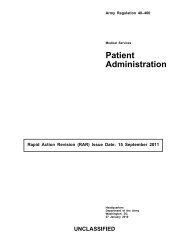AR 600-20, Army Command Policy - Army Publishing Directorate ...
AR 600-20, Army Command Policy - Army Publishing Directorate ...
AR 600-20, Army Command Policy - Army Publishing Directorate ...
Create successful ePaper yourself
Turn your PDF publications into a flip-book with our unique Google optimized e-Paper software.
procedures or care. (This provision also applies if the Soldier is believed incompetent and medical board action is<br />
pending.) These Soldiers may also be given routine medical care needed to treat minor ailments.<br />
(6) Diagnostic medical care. Medical care of a diagnostic nature may be undertaken in order to determine whether a<br />
situation exists that would authorize other medical care to be performed.<br />
(7) Physical and other examinations. Physical examinations and associated procedures, and dental or radiological<br />
examinations may be required when one or more of the following apply:<br />
(a) Required by law or regulation.<br />
(b) Authorized to be performed without consent by law or other regulations.<br />
(c) Directed by an individual’s commander or other appropriate official in order to determine the individual’s fitness<br />
for duty.<br />
(8) Obtaining evidence. Nothing in this paragraph limits the authority of appropriate officials to order the performance<br />
of medical procedures for the purpose of obtaining evidence without the consent of the individual concerned, and<br />
without board action in cases where such procedures are authorized under other regulations or the Military Rules of<br />
Evidence (MRE), MCM.<br />
d. Refusal to submit to medical care other than care described in paragraph c, above.<br />
(1) Soldiers who refuse to submit (or whose court-appointed guardian or other legal representative objects) to<br />
recommended medical care will be referred to a medical board (see <strong>AR</strong> 40–3, para 7–5).<br />
(2) Soldiers will be referred to a medical board if they refuse to submit to dental care and/or radiographic (X-ray)<br />
procedures deemed necessary by the installation dental surgeon to create dental record and panographic records of the<br />
oral dentition to—<br />
(a) Aid in remains identification.<br />
(b) Treat dental conditions judged to be prejudicial to military operations or deployment that may result in<br />
evacuation or treatment within the first 12 months (see <strong>AR</strong> 40–400).<br />
(3) When a Soldier refuses to submit to recommended care because of religious practices, the provisions of<br />
paragraph 5–6 apply.<br />
e. Medical board proceedings when medical care is refused.<br />
(1) The examining medical boards report should contain the following information:<br />
(a) Statement that the proposed treatment will relieve the incapacity and aid the Soldier’s return to a duty status.<br />
(b) Statement that the proposed treatment is an established procedure that qualified and experienced physicians<br />
ordinarily would recommend and undertake.<br />
(c) Statement that the Soldier’s refusal to undergo treatment is reasonable or unreasonable, or, in the case of a<br />
mentally incompetent Soldier, a statement that compulsory treatment is warranted. Consideration should be made of the<br />
risks ordinarily associated with the proposed treatment, the Soldier’s age, general physical condition, and his or her<br />
reasons for refusing treatment.<br />
(2) Generally, refusal of medical care is considered unreasonable without substantial evidence that the treatment is<br />
inadvisable. However, in deciding whether refusal of medical treatment, including surgery, is reasonable or unreasonable,<br />
the board should consider among other things—<br />
(a) Existing evidence that the physical or mental treatment is inadvisable.<br />
(b) Previous unsuccessful operations and procedures.<br />
(c) Any special risks involved in the proposed medical treatment.<br />
(3) The report of the medical board proceedings will show the need and risk of the proposed medical care refused<br />
by the Soldier. Moreover, it will show that the Soldier was given the chance to appear in person and will indicate if the<br />
Soldier’s condition permitted appearing. The report will further show that the Soldier was given the chance to submit a<br />
written statement explaining the grounds for refusal. Any statement submitted will be sent with the report.<br />
(4) Soldiers believed to be incompetent will be aided by a representative who may appear in their behalf. The<br />
representative need not be legally qualified.<br />
(5) The Soldier will be informed of the approved findings and advised whether the board has determined that the<br />
proposed medical care is needed to—<br />
(a) Protect the Soldier’s health.<br />
(b) Protect the health of others.<br />
(c) Enable the Soldier to perform his or her duties properly.<br />
(6) The board findings must also state that the proposed care will have a positive effect.<br />
f. Results of medical board proceedings. Soldiers must be given the results of the board proceedings and offered the<br />
opportunity to accept the prescribed medical care. If the Soldier still refuses, the MTF commander will send the<br />
medical board proceedings to HQDA (DASG–HS–AS), 5109 Leesburg Pike, Falls Church, VA 2<strong>20</strong>41–3258 for<br />
review. When refusal to submit to the prescribed medical care is based on religion, TSG will refer the medical board<br />
proceedings to the DCS, G–1 for review and an advisory opinion before action.<br />
(1) TSG will either approve or disapprove the medical board proceedings and return them to the MTF commander.<br />
(2) If TSG approves the medical board proceedings, the Soldier is again given the chance to accept treatment. If the<br />
<strong>AR</strong> <strong>600</strong>–<strong>20</strong> 18 March <strong>20</strong>08<br />
35
















